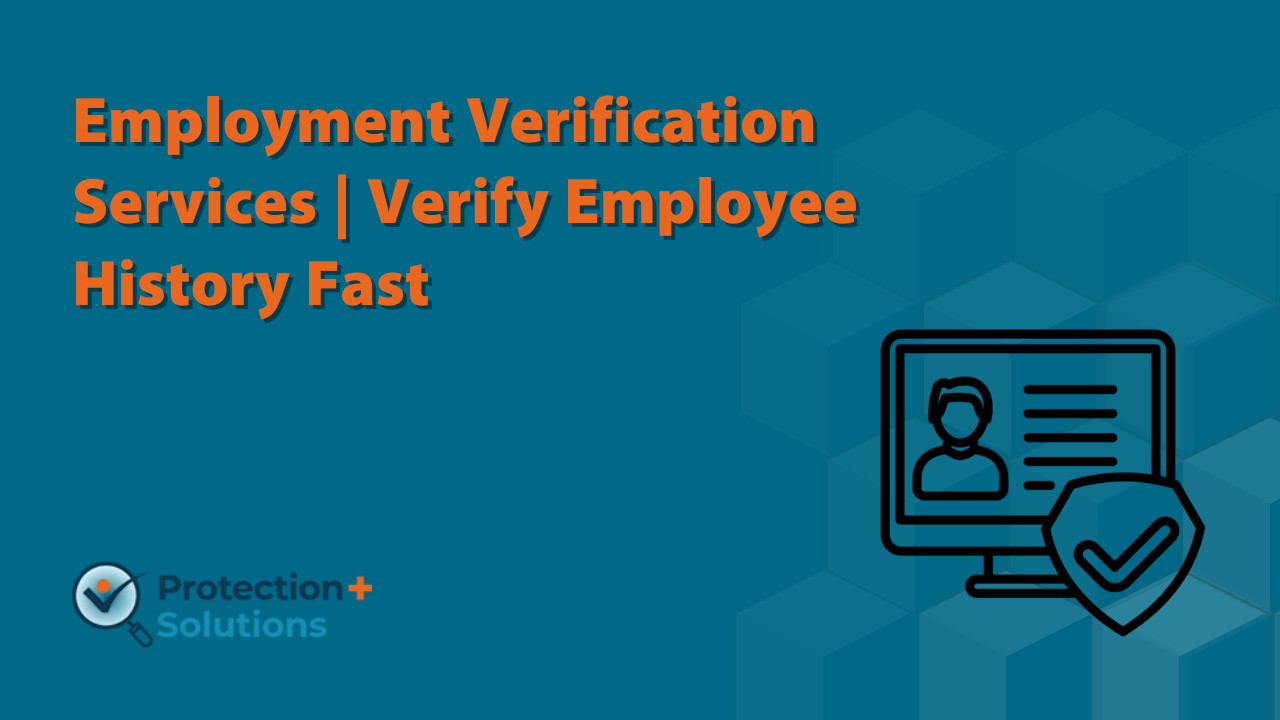Employment Verification Services | Verify Employee History Fast

What are employment verification services?
Employment verification services are professional solutions used by companies to confirm if a candidate’s employment history, roles, and tenure are genuine. Imagine you’re buying a car – you check the registration, service history, and ownership to avoid surprises. Employment verification works the same way but for hiring.
Why are they important for businesses?
They protect employers from fraud, misrepresentation, and risky hires. Hiring someone based on false information can cost your business reputation, clients, or even compliance penalties.
Types of Employment Verification
Basic employment verification
This verifies dates of employment, job titles, and the companies worked for. It’s the simplest form of check used in most standard recruitments.
Detailed employment history check
Here, services confirm additional data like duties, performance, reasons for leaving, and eligibility for rehire. This is essential for senior roles or sensitive positions.
International employment verification
When hiring globally, verification expands to include foreign employers, varying data privacy laws, and cross-border compliance checks.
How Employment Verification Works
The standard verification process
- Consent collection – Candidate signs a release.
- Information gathering – Employer provides data to the verification service.
- Outreach to previous employers – Calls, emails, or system-based checks.
- Reporting – The verified data is compiled into a final report.
Data collected during verification
Typically, services collect:
- Dates of employment
- Position titles
- Reporting managers (sometimes)
- Duties and responsibilities
- Reason for leaving (if permitted)
Benefits of Using Employment Verification Services
Reducing hiring risks
It prevents you from onboarding someone with fake credentials, which could lead to performance failures or legal liabilities.
Compliance with regulations
Industries like healthcare, finance, or education must verify employee histories to comply with federal and state guidelines.
Improving quality of hires
When candidates know their history will be verified, it reduces the chance of dishonesty, ensuring a pool of honest and qualified applicants.
Challenges in Employment Verification
Data privacy concerns
Employers must ensure candidate data is handled with strict confidentiality to comply with laws like GDPR or CCPA.
Inaccurate records
Sometimes, past employers maintain outdated or incorrect records, delaying or complicating the verification process.
Delays in verification
Certain employers take longer to respond or require special procedures, impacting the candidate onboarding timeline.
Employment Verification in Different Industries
Corporate and tech sectors
These industries use verification to ensure candidates truly possess the experience listed, as wrong hires in strategic roles can lead to heavy losses.
Healthcare sector
Verification is mandatory to confirm licensing, prior practice, and potential disciplinary actions to safeguard patient care standards.
Education sector
Schools and universities must check academic and employment histories to protect students and maintain credibility.
Choosing the Right Employment Verification Service Provider
Factors to consider
- Turnaround time
- Data security standards
- Industry experience
- Global verification capabilities
- Cost-effectiveness
Questions to ask before hiring
- How do you ensure data privacy compliance?
- Do you handle international verifications?
- What is your average turnaround time?
- Do you integrate with ATS or HRMS platforms?
Technology in Employment Verification
Automation and AI verification tools
Modern services use AI to auto-verify basic employment data, reducing turnaround time from days to hours.
Blockchain for verification security
Some startups leverage blockchain to store verified credentials permanently, eliminating repetitive verifications for future employers.
Employment Verification and Remote Hiring
Importance in virtual onboarding
With remote hiring on the rise, verifying employment remotely ensures that virtual teams are built on genuine talent.
Cross-border employment checks
Hiring internationally requires compliance with both local and foreign data privacy and employment verification laws.
Legal and Compliance Aspects
Adhering to FCRA guidelines
In the US, the Fair Credit Reporting Act governs employment background checks, ensuring candidates provide informed consent.
Consent and employee rights
Candidates must be notified and provide consent before verification. They also have rights to dispute inaccurate data found in reports.
Cost of Employment Verification Services
Factors affecting pricing
- Volume of checks
- Type of checks (basic or detailed)
- International vs. domestic verifications
- Service provider’s technology infrastructure
Is it worth the investment?
Yes. The cost of a bad hire far outweighs the cost of verification services in terms of lost productivity, legal risks, and rehiring costs.
Future of Employment Verification
Trends to watch
- Blockchain-based credential records
- Global standardized verification platforms
- AI-enabled real-time verification systems
Integration with HR tech ecosystems
Verification tools are increasingly being embedded into applicant tracking systems, making the process seamless and faster.
Tips for Employers
Streamlining your verification process
- Choose services that integrate with your HR systems
- Collect candidate consent early
- Provide accurate data to avoid delays
Maintaining candidate experience
Keep candidates informed about each stage of verification to build trust and ensure a smooth onboarding journey.
Conclusion
Employment verification services are not just another hiring step – they’re an essential shield protecting your business from false claims, compliance breaches, and poor hires. By understanding how they work, choosing the right provider, and integrating them into your hiring process, you set your organization up for strategic, compliant, and confident hiring decisions.
Ready to simplify your hiring process? Get started with our reliable employment verification services today – contact us for a free consultation!

